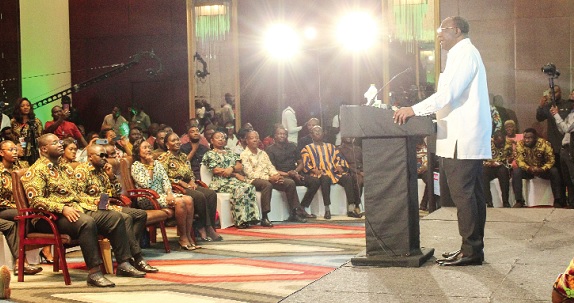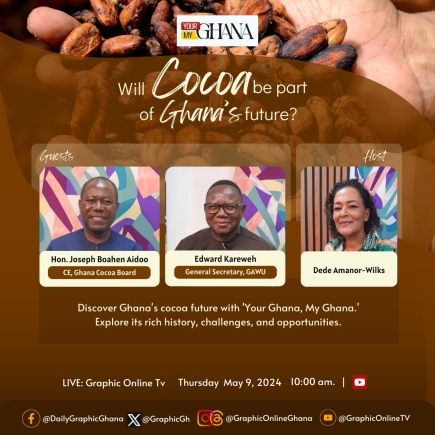
Alan's third force agenda, farce or reality?
Alan Kwadwo Kyerematen, who has nurtured presidential hopes since 2007, on Monday confirmed his resignation from the New Patriotic Party (NPP) and announced a new ambition to vie for the presidency in 2024 as an Independent candidate.
Advertisement
The former Minister of Trade and Industry said he offered a new hope beyond the duopoly of the NPP and the National Democratic Congress (NDC) and promised to establish and lead a new "movement for change" in Ghana, one of inclusivity that, he said, would make room for the NPP and the NDC, and other parties and political organisations should he win the presidential polls.
While the Fourth Republic is not lacking in political parties of different persuasions, none had come close to usurping the supremacy of the NPP and the NDC.
Those who finish in third place always come at a big distance from the two front runners, and usually of the Nkrumaist stock.
Over the years, parties such as the Progressive People’s Party (PPP), People’s National Convention (PNC) and the Convention People’s Party (CPP) have faded in popularity and votes, sometimes making a combined total of less than five per cent of the total votes.
Alan’s appeal
In spite of Mr Kyerematen’s supposed appeal, he appears to have a tall order reaching a height that established parties have struggled to attain.
Whether his ambition of breaking the duopoly of the NPP and the NDC is a farce or a reality remains to be seen.
Meanwhile, three political scientists have cautioned that Alan Kyerematen’s exit from the New Patriotic Party (NPP) for a second time could impact the party’s chances in the 2024 general election.
An Associate Professor of Marketing, specialising in Political Marketing at the University of Ghana Business School, Prof. Kobby Mensah; a lecturer at the Political Science Department of the University of Education, Winneba (UEW), Dr George Asekere, and a lecturer at the University of Media, Arts and Communication (UniMAC-GIJ), Dr Etse Sikanku, said how the party would handle the situation between now and December 2024 would prove crucial to the outcome of the polls.
Prof. Mensah said Mr Kyerematen’s exit could have a negative impact on both the NPP and the NDC.
He said the development could potentially harm the NPP because Mr Kyerematen had over the years been a key figure in the party, and as a result, cultivated a certain following.
“Clearly, he is one of the most dynamic potential figures in the country.
He has been with the NPP from the very beginning; one of the founder members. He has performed quite a number of political roles and appointments in the party in the Kufuor and Nana Addo governments respectively,” he stressed.
“He has contested for the flagbearship on a number of occasions, and that means he has cultivated a certain following or constituency that believes in his leadership, principles and politics.
With that character, going independent is a big statement for the political system, which has the potential to change the political dynamics in Ghana,” Prof. Mensah added.
Breaking the jinx
Prof. Mensah further stressed that Mr Kyerematen’s decision could ruin the party’s goal of “breaking the eight”.
That, he said, was because the former Minister of Trade and Industry’s following was largely centred in the Ashanti Region, which served as one of the strongholds of the entire party.
“There are people who absolutely believe they can be given another term having squandered eight years, and having one of the most significant personalities in their party break away, it is almost a nail in the coffin to break the eight,” he said.
Prof. Mensah said individuals who were initially going to vote for the NDC because they had been disappointed in the NPP’s leadership could have a dilemma and could even be swayed to join Mr Kyerematen.
“It is dicey because those who are in the middle, not really partisan but are craving for good leadership, could be persuaded by Alan Kyerematen, depending on his campaign,” he added.
“So, for those who would be going in to vote NDC because of the disappointment of NPP, they would probably be in a dilemma, thinking they’ve seen both party governments over the years might perhaps try Alan Kyerematen.
So that dilemma would be lingering in people who we usually call floating voters swaying to NDC with the entry of Alan Kyerematen,” he explained.
Internal democracy
On the other hand, Dr Asekere urged the NPP to address its internal democratic challenges to prevent the party from losing more supporters to Mr Kyerematen’s camp.
Looking at the current happenings in the party, he said it was clear that democracy was not at work.
He said this was because the party’s structure appeared to be in support of one candidate against the remaining candidates.
Dr Asekere suggested that the national council of the party should immediately have a meeting and take practical steps to address internal democratic challenges.
“The playing field should be made fair for all the candidates going for the November 4 polls, and if that is demonstrated, the party supporters and voters will be convinced that democracy is reigning in the party.
This can help win back their trust and prevent them from going to Alan’s camp,” he said.
He said Mr Kyerematen’s resignation did not come as a surprise since the party had “continuously been unfair to him and treated his supporters as outcasts”.
More alternatives
Dr Sikanku said this was an interesting development within the country’s democracy as it presented more choices and alternatives for the citizenry.
“We can only look forward to how it pans out in the coming weeks.
Absolutely, an independent candidate can make a difference in terms of not necessarily winning but playing kingmaker or changing the dynamics of the fortunes of the two major parties,” he stated.
Indeed, political watchers are drawing similarities between Mr Kyerematen’s resignation from the NPP and a 1979 scenario.
In what looks to repeat itself today, the UP tradition split in 1979 due to the breakaway of William Ofori Atta, popularly known as Paa Willie, to form the United National Convention (UNC) after losing the Popular Front Party’s (PFP) primary to Victor Owusu.





